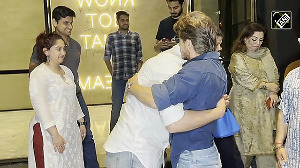Though he went back to writing "beautiful scenes" for other Bollywood directors, his deep interest in the lives of ordinary citizens never slackened, evident from the way he made himself available to human rights groups whenever they called him.
Jyoti Punwani remembers a most unusual writer and human being.

"A writer can never be original in Hindi cinema."
This is what Sagar Sarhadi told this reporter a few weeks after the release of Bazaar.
Nothing if not original, this 1982 film remains the definitive film on the sordid practice of poor Muslim teenagers being married off to Arabs, which continues in Hyderabad even today.
Sagar Sarhadi, who passed away on Monday morning at the age of 87, led a schizophrenic life in Mumbai's film industry.
He wrote the screenplay and dialogues for the most "romantic" movies, but the films he made took a hard, realistic look at relationships.
The films for which he wrote -- Kabhi Kabhie, Noorie, Silsila, Chandni -- were hits, but except for Bazaar, none of the films he made could even be released.
The success of Kabhi Kabhie (1976), for which he wrote the screenplay and dialogues, helped Sagar Saab as he was called, buy a fancy flat at Juhu. But despite Bazaar's success, he had to sell the Juhu flat and move to distant Malad within a few years.
Later, he sold that flat too and moved back to his first home in Sion Koliwada, which he had shared as a student with his brothers and bhabhi, who he recalled, would cook under a leaking roof, her ankles deep in water, the stove kept on the bed.
Sagar Sarhadi never wanted to write for the film industry, he told this reporter.
He was happy doing plays with his theatre group called Curtain, in which actors who later became big stars, including Sanjeev Kumar and Rajesh Khanna, used to act.
He knew that in the film industry, he wouldn't be able to write about what he wanted -- the everyday problems of the common man -- which were the theme of his plays.
His experience bore this out.
Having written for movies starring the top stars of the day, he found that the writing had to be geared towards their larger-than-life persona.
"When you sign up Amitabh Bachchan, you have to think of the lines he would speak. The thematic content will come much later," he pointed out in an interview to this reporter.
No writer could contribute anything to others' films, given the finances involved, he added.
"Films depend on financiers, who look on them purely as business propositions. The producer must earn enough to pay back the financier and then some more for himself. That's how he decides what sort of film to make...Only after all this is worked out, the writer is hired to write a few beautiful scenes. A writer can never be original."
Years of doing this had "damaged his personality", he said angrily. "My early plays were known for their style, now I've lost that edge."
That was the reason he decided to write and direct Bazaar.

Bazaar could find a buyer only after 50 trial shows, despite its stellar performances and music. It was only after the distributors saw women come out of the theatre in tears that they thought it worth buying.
Inspired by Sarhadi's own encounter with an NRI who came to India looking for a bride, and ended up marrying a 15 year old in Hyderabad, Bazaar was one of the rare movies in which, despite all the characters being Muslim, none was a stereotype.
Despite its commercial success, this first directorial venture of his ended up being the only film of his that was properly released. Tere Sheher Mein (1985), on the inaccessibility of justice for the poor, was stuck because the producer could not pay the financier, who retaliated by taking away the film's reels.
In 1989, he made Agla Mausam, based on the turmoil in Punjab during the Khalistan years, but this too remained unreleased.
In 2004, Sarhadi approached Manmohan Shetty, known for producing off-beat films, with the idea of Chausar, a film set in rural India, with a then unknown Nawazuddin Siddiqui in the lead. The film revolved around a man driven by an amoral power structure to stake his wife.
Shetty rejected it immediately.
Chausar was finally released in 2018, but flopped.
***

However, these failures didn't change Sagar Sarhadi.
Though he went back to writing "beautiful scenes" for other Bollywood directors, his deep interest in the lives of ordinary citizens never slackened, evident from the way he made himself available to human rights groups whenever they called him to preside over a public meeting.
One such meeting stands out vividly in memory.
In 1986, the Mumbai-based Committee for the Protection of Democratic Rights (CPDR) requested Sagar Sarhadi and poet Baqar Mehdi to release its report on the firing that accompanied a demolition drive in Null Bazaar carried out by then officer on special duty with the BrihanMumbai Municipal Corporation, G R Khairnar.
CPDR's members had gone shop to shop, collecting information on the incident and the damages suffered by the shopkeepers; they were sure the latter would turn up for the meeting. They even brought out an Urdu version of their report.
Alas! As the minutes ticked by and the chief guests cooled their heels in the large hall in Null Bazar booked by CPDR, it became clear that no one was going to turn up.
Ignoring the advice of the area's 'social workers', CPDR had refused to take the help of the local political heavyweights during their fact-finding, and had not even invited them to the release. The word had gone out then, that it was best to stay away from these outsiders to the area and to the system of patronage that held it in its grip.
Barely five persons turned up; one of them a drug addict who went off to sleep. But neither Sagar Sarhadi nor Baqar Mehdi complained, nor did they break off ties with CPDR.

Journalist Gurbir Singh remembers taking Sarhadi through the narrow lanes of slums where worked the Nivara Haq Samiti. "He never refused to come to address our meetings, even at short notice," says Gurbir who remained close to him till his last days.
Nor did he flinch from speaking up for Vidrohi editor and Dalit activist Sudhir Dhawale, when the latter was arrested in 2011 for sedition and under the dreaded UAPA. Calling his arrest 'a witch hunt', Sarhadi described Dhawale, who had performed Sarhadi's play Raj Durbar in Nagpur, as "a decent man, an enthusiastic student of theatre."
At the age of 82, Sarhadi was involved in a people's tribunal set up by Medha Patkar's Narmada Bachao Andolan in the small town of Badwani located on the banks of the Narmada.
This reporter last met him in 2015 at the seventh Anuradha Ghandy Memorial Lecture delivered by Dalit feminist poet Meena Kandasamy, and was greeted with a hug and his characteristic greeting: "Saali, tu kahan hai aaj kal?"
What kept him going even at this age?
One was his huge curiosity.
City historian and film connoisseur Rafique Baghdadi recalls how he would eagerly ask about new books; "he was greedy for books." Gurbir remembers him insisting on being informed of every protest meeting. "He would invariably attend it."
He also had a natural affinity towards young people. Whether in Juhu or Malad, his was an open house specially for "strugglers" in the film industry, says Baghdadi. They knew a hot meal always awaited them.
Indeed, Chausar was made for such strugglers, Sarhadi told this reporter.
"In the big TV productions, these people have to just leave their bio-data at the gate.
Or sleep with whoever calls the shots," he explained.
"In the FTII, you expose a student to the best of world cinema, and he ends up waiting hours at Subhash Ghai's gates. The same with the NSD. After Shakespeare, Kalidas, Ibsen, these kids end up living three to a room in some distant suburb."
"I saw the depression they were going through and wanted to channelise the energy of these talented youngsters, give them some motivation," he said. "This film was meant to be a small vehicle for them. They even helped flesh out the characters, because the two heroes were themselves from such backgrounds."
For someone like Sarhadi, last year's long lockdown proved too much to cope with, says Baghdadi, who visited him whenever he could during those months.
"As it is, after he shifted to Koliwada, he got few visitors, and there weren't too many people in the neighbourhood with whom he could have the conversations he enjoyed. Alone in a house full of books, he grew increasingly isolated and lonely. There is no cure for that."
Baghdadi laments that though Sagar Sarhadi was brimming with ideas and wanted to make films right till the end, he couldn't get the money to do so.
"Though he was as active as ever, the world had changed."
Feature Presentation: Ashish Narsale/Rediff.com












 © 2025
© 2025